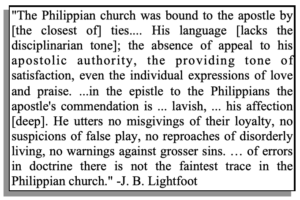I have been making an attempt at a weekly blog but a lot depends on my mood. My current mood, as I noted last week, is “contemplative.” That’s probably why I have taken a peaceful and meditative interest in Paul’s letter to the body of believers at Philippi. As an institution, all remembrance of them disappeared from the annals of church history by the  second century. But for Paul, as a Roman prisoner, the faces in this tiny congregation became a cherished memory that often reminded him that his life was never without meaning. He called them “beloved and his joy and crown” [Philippians 4:1]. Only the believers in Philippi and Thessalonica received such commendation. And Paul thought this of “all” the Philippians. No fewer than eleven times he spoke inclusively of every believer in this congregation as if his heart would not let him forget any of them. “Every time I recall the fellowship we shared,” (if I might translate freely) he noted, “I am overcome with joyous appreciation to the Lord for bringing us together. I pray for each of you often asking our Lord to meet every need you have” [Philippians 1:3-4].
second century. But for Paul, as a Roman prisoner, the faces in this tiny congregation became a cherished memory that often reminded him that his life was never without meaning. He called them “beloved and his joy and crown” [Philippians 4:1]. Only the believers in Philippi and Thessalonica received such commendation. And Paul thought this of “all” the Philippians. No fewer than eleven times he spoke inclusively of every believer in this congregation as if his heart would not let him forget any of them. “Every time I recall the fellowship we shared,” (if I might translate freely) he noted, “I am overcome with joyous appreciation to the Lord for bringing us together. I pray for each of you often asking our Lord to meet every need you have” [Philippians 1:3-4].
The church at Philippi was never ensnared by the heresies and twisted, compromised, religious thinking of the day. Unlike the churches at Rome or Galatia or Ephesus or, indeed, Corinth, the Philippians were from the first day to the present (Paul’s own words, Philippians 1:5) fellow laborers in the gospel message. And Paul knew with absolute assurance God’s work among them would flourish [Philippians 1:6].
Then Paul’s pen must have hesitated because Philippians 1:7 can have two meanings according to the grammar: Did he write, “I have you in my heart” or “You have me in your heart”? Why not both meanings! He added, “this is the absolute truth, and I know I’m right, And I see it this way about each and every one of you!”

River Anghista near the site of Philippi
You see, this shared passion for Christ, shared joy in their common salvation, and a shared interest in Christ’s sufferings through persecution, was a shared defense of and confirmation of the reality that is in serving Christ. Paul was never alone because he had been to Philippi and gone to the banks of the River Anghista to pray [Acts 16:13].
I could go on, playing the commentator of this warm recollection of what Paul’s service to the Savior was always all about. But I will let you study it for yourself. Paul didn’t know if his imprisonment would end in release [Philippians 2:24] or martyrdom [Philippians 2:17] but either way, his heart was rejoicing.
And what about my mood? I, too, have sweet abiding memories of what God did to which I bore joyful witness and of which now I sit in quiet meditation—of how good God is, indeed.
Truly, God is good [Psalm 73:1].

